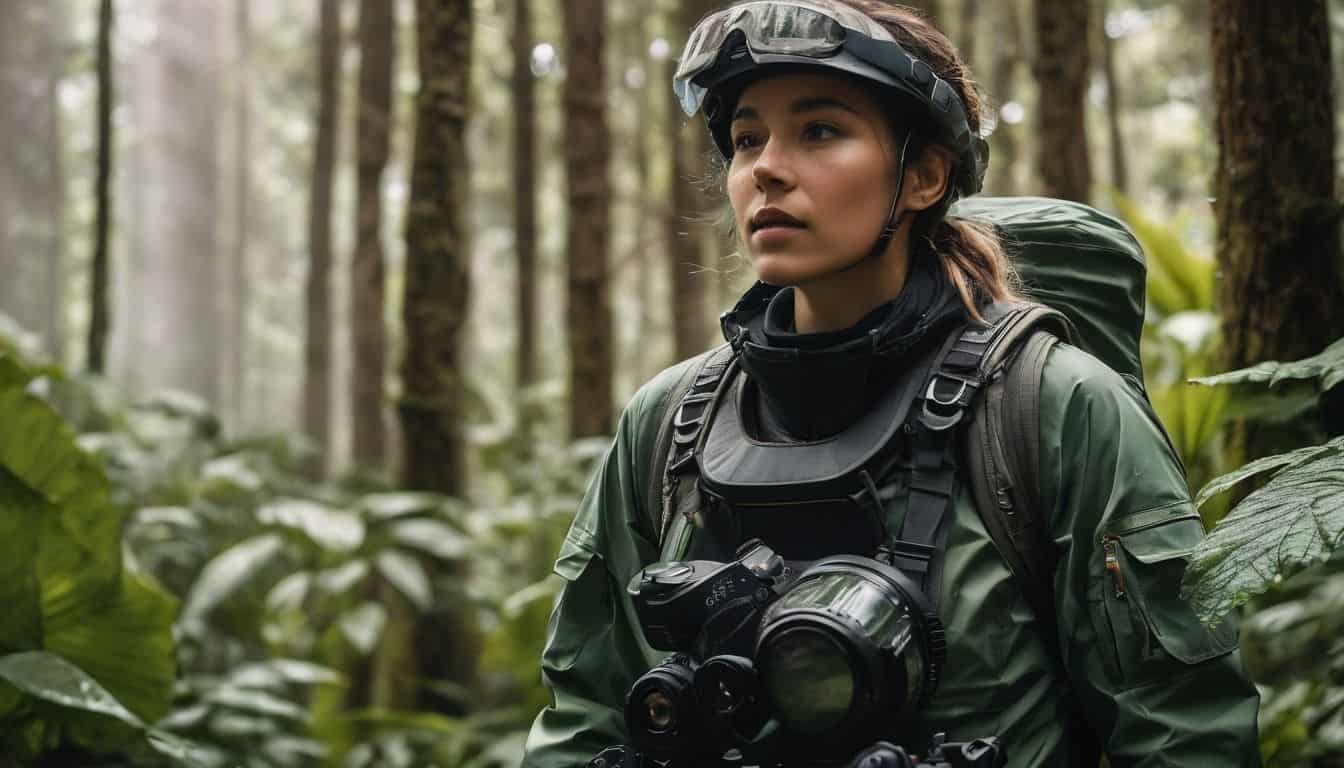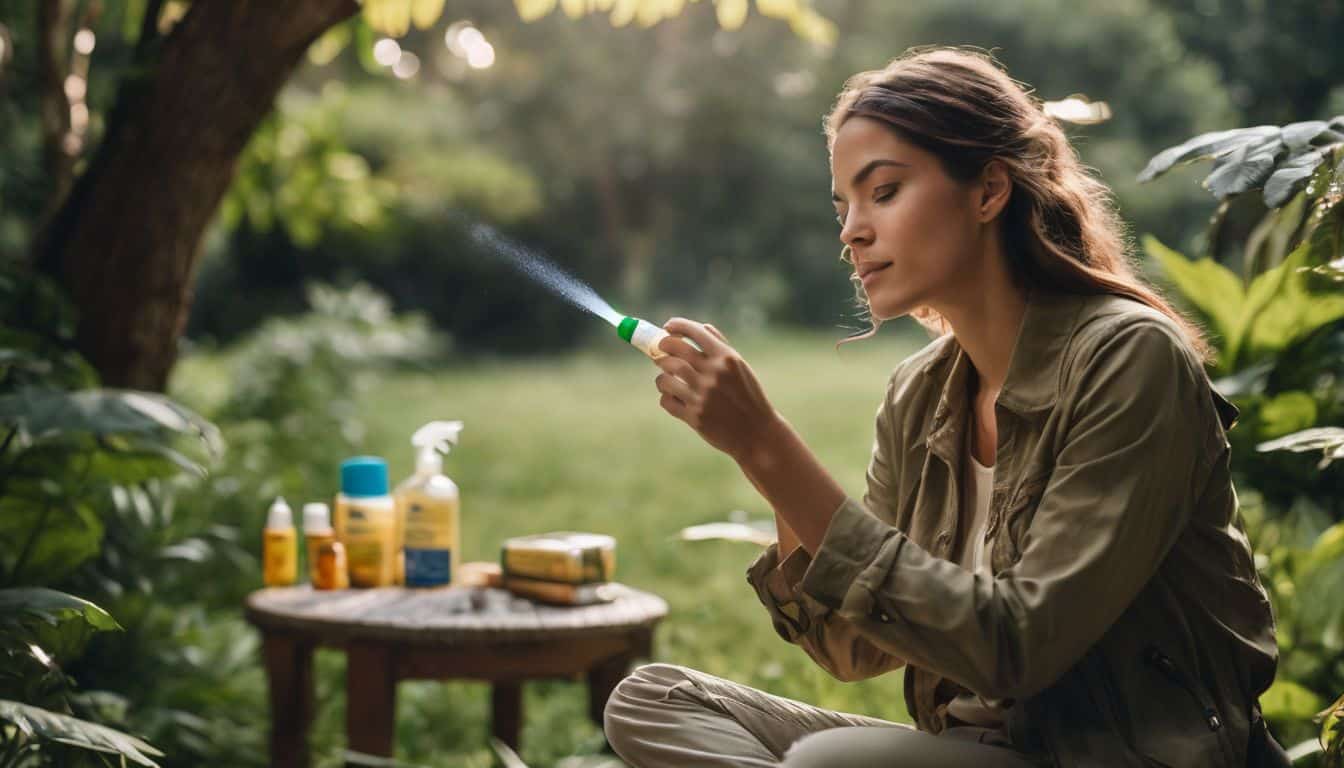Do you find yourself endlessly waging war against annoying bugs or tending to those irritating bug bites? Trust me, I can feel your frustration! These seemingly insignificant insects can indeed pose quite a nuisance, and in some cases, even turn out to be dangerous.
After years of personal battles with these little critters and extensive research, I’ve come up with five effective strategies that promise some relief from these miniature marauders.
Let’s gear up together to take back our beloved summer from the clutches of these tiny trespassers!
Key Takeaways
- Protecting yourself from harmful insects is important due to the health risks and discomfort they can cause.
- Wear long sleeves and pants, use insect repellents, and avoid scented products to protect yourself from bites and stings.
- Eliminate standing water, cover trash containers, clean up clutter, and use natural repellents to prevent insects from breeding.
- Maintain a clean living environment by regularly cleaning and vacuuming your home, sealing cracks in windows and doors, and keeping outdoor areas well-maintained.
Importance of Protecting Yourself from Harmful Insects
Protecting yourself from harmful insects is crucial due to the various health risks and diseases they can carry, as well as the discomfort caused by insect bites and allergic reactions.
Health risks and diseases carried by insects
Bugs like ticks, mosquitos, fleas, and flies bring sickness. They carry bad stuff like malaria and Lyme disease. These bugs are small but can cause big harm. Their bite might seem tiny but the damage is not.
People’s bodies react differently to bug bites – some feel itchy while others may get very sick. It is best to stay away from these bugs as much as we can. Let’s make sure they don’t get too close for comfort!
Allergic reactions and discomfort caused by insect bites
Insect stings and bites can cause a lot of pain. Some might even make you very sick. For some, the bite or sting may cause an allergic reaction, like swelling or itching. Others may feel dizzy or have trouble breathing right after an insect sting.
This is called anaphylaxis and it needs medical help at once! Spider bites too can make your skin swell up in a small area around the bite. Diseases like yellow fever and malaria also come from bug bites but we can stop them with vaccines or meds.
The main point here is – all insect bites are different but none of them are good for us! So, do your best to stay away from harmful insects for a safe day outside.
Basics of Protecting Yourself from Harmful Insects

Start with a clean house. Less mess leaves fewer spots for bugs to hide. It’s also smart to change your yard. Plant local flowers and trees. They are better at stopping bed bugs than grass lawns.
Do not use too many bug sprays or killers! Some can do more harm than good. Get ones that the EPA says are safe instead.
Be wary of wild or stray animals, they can carry bugs and germs on them. If you see one, steer clear.
For bedtime, keep an eye out for bed bugs. Watch your beds and couches closely!
You should also pay attention to what you wear outside in places with lots of insects like mosquitoes.
Wear Protective Clothing
To protect yourself from harmful insects, it is essential to wear long sleeves and pants as a form of barrier against bites and stings.
Long sleeves and pants
Long sleeves and pants are essential when it comes to protecting yourself from harmful insects. They provide a physical barrier that prevents insects, like mosquitoes, from biting your skin.
It’s important to choose clothing made of thicker materials, as lightweight fabrics may not offer enough protection. When wearing long-sleeved shirts and pants, make sure they fit loosely to maximize coverage and minimize the chances of insect bites.
Remember to tuck your shirt into your pants and your pants into your socks for added protection against mosquitoes. By covering up with long sleeves and pants, you can greatly reduce the risk of insect-related health issues.
Use insect repellents
Using insect repellents is an important way to protect yourself from harmful insects like mosquitoes and ticks. These tiny bugs can carry diseases and cause discomfort with their bites.
When choosing a repellent, look for ones that contain DEET or Picaridin as these are the most effective at keeping bugs away. Make sure to apply the repellent to any exposed skin and reapply it according to the instructions on the label.
By using insect repellents, you can greatly reduce your chances of getting bitten and keep yourself safe from insect-borne illnesses.
Another option for repelling insects naturally is using essential oils such as citronella, lavender, or eucalyptus. While these may not be as effective as chemical-based repellents, they can still provide some protection against bug bites.
You can also plant insect-repelling herbs in your garden to help deter insects from coming near your home. Just remember that when it comes to protecting yourself from harmful insects, using a reliable insect repellent is one of the best preventive actions you can take.
Avoid wearing scented products
I never wear scented products when I’m out in nature because they can attract insects. Fragrant items like perfumes, lotions, and sprays can make you more likely to get bitten or stung by insects.
Insects are drawn to the smell of these products, so it’s best to avoid using them if you want to protect yourself from harmful bugs. By skipping the scented stuff, you decrease your chances of attracting those pesky insects and reduce the risk of getting bitten or stung.
Eliminate Insect Breeding Grounds
To prevent the spread of harmful insects, it’s crucial to eliminate their breeding grounds. Learn how to remove standing water and reduce hiding places for insects to keep yourself safe.
Read on to find out more!
Remove standing water in open containers, gutters, and tires
To keep yourself safe from harmful insects, it’s important to get rid of standing water in open containers, gutters, and tires. Mosquitoes can breed in stagnant water found in these areas, and they can transmit diseases like West Nile virus.
Dumping and draining the standing water is a highly effective way to prevent mosquito production around your home. Stagnant water that remains undisturbed for at least seven days attracts mosquitoes, so it should be eliminated as soon as possible to stop them from breeding.
Cover trash and recycling containers to prevent water accumulation
Covering trash and recycling containers is an important step in preventing water accumulation, which can create ideal breeding grounds for insects. When water collects in open containers or bins, it becomes a perfect environment for mosquitoes to lay their eggs and multiply.
This poses a risk of mosquito-borne diseases such as West Nile virus and dengue fever. Additionally, standing water also attracts other pests like flies and cockroaches.
To keep your trash areas bug-free, make sure to cover both the interior and exterior bins tightly. Use lids or secure covers that fit properly to prevent any gaps where bugs can enter.
It’s also essential to empty the containers regularly so there is no stagnant water left behind. By taking these simple steps, you can help minimize the risk of insect infestations around your home while ensuring clean and pest-free waste disposal areas.
Clean up clutter to reduce hiding places for insects
Cleaning up clutter is an important step in protecting yourself from harmful insects. Cluttered areas provide hiding places for bugs, making it easier for them to infest your home.
By decluttering and organizing your living spaces, you can eliminate their preferred breeding grounds and reduce the chances of a pest invasion. Remember, pests not only hide in clutter but can also find food sources within the mess.
Regular cleaning and maintenance will help keep your surroundings clean and minimize the risk of insect infestations.

Use Natural Insect Repellents
Protect yourself from harmful insects by using natural insect repellents, such as essential oils like citronella, lavender, and eucalyptus.
Essential oils such as citronella, lavender, and eucalyptus
I love using essential oils like citronella, lavender, and eucalyptus as natural insect repellents. These oils are great at keeping bugs away because they have properties that insects don’t like.
For example, citronella oil masks scents that attract insects, making it harder for them to find you. Lavender oil has even been proven to repel mosquitoes in a study from 2002. The best part is that using essential oils is safe and environmentally friendly.
So next time you’re heading outdoors, consider using these natural bug repellents to protect yourself from harmful insects.
Plant insect-repelling herbs in your garden
I love planting insect-repelling herbs in my garden because they help keep those pesky bugs away. Some great options include lavender, basil, and marigolds. Lavender is disliked by many insects, including mosquitoes, due to its strong scent.
Basil and marigolds are known for their ability to repel unwanted bugs like mosquitoes. These plants not only add beauty to your garden but also act as a natural pest deterrent. So if you’re looking for a natural way to keep insects at bay, try planting these insect-repelling herbs in your garden!
Maintain a Clean Living Environment
Regularly clean and vacuum your home to eliminate any potential hiding places for insects.
Regularly clean and vacuum your home
Maintaining cleanliness in your home is crucial for protecting yourself from harmful insects. By regularly cleaning and vacuuming, you can prevent infestations and get rid of any insect eggs or adults that may be present.
A clean living environment also helps to avoid attracting insects by keeping food spills and dirty dishes at bay. Make sure to clean windows, curtains, and freshen up the house regularly as part of effective house cleaning.
Taking these simple steps will go a long way in safeguarding your home from unwanted pests.
Seal cracks and gaps in windows and doors
Sealing cracks and gaps in windows and doors is really important. It helps to keep harmful insects out of your home. You can use caulking to seal small cracks in windows and prevent bugs from getting inside.
If you have older windows, make sure to seal any cracks with caulk too. Sometimes, the silicone caulking around window frames can crack over time and create gaps where bugs can enter.
So, by sealing these cracks and gaps, you can keep your living environment clean and bug-free!
Keep outdoor areas well-maintained and free of debris
Maintaining a clean and well-maintained outdoor area is crucial for creating a safe environment. When we keep our outdoor spaces free of debris, such as fallen leaves, branches, and trash, we can help prevent the harboring of harmful insects.
These pests often seek shelter in areas with clutter and debris, which can lead to infestations and potential health risks. By regularly cleaning up our surroundings and removing any potential hiding spots for insects, we are taking proactive steps towards protecting ourselves from these unwanted visitors.
Let’s remember that a tidy outdoor space not only improves the overall aesthetics but also contributes to our wellbeing by reducing the risk of insect-related issues.
Additionally, maintaining an organized outdoor area helps prevent pollution and environmental damage. Littering or neglecting proper waste disposal can result in land, air, and water pollution — all of which have adverse effects on both human health and the ecosystem.
Taking responsibility for keeping our surroundings clean ensures that we are doing our part in preserving nature while safeguarding ourselves against harmful insects.
Educate Yourself about Harmful Insects in Your Area
Learn about the harmful insects that are prevalent in your area by researching local species, their habitats, and behaviors. Understand the signs and symptoms of insect-borne diseases to better protect yourself from potential harm.
Learn about local species, their habitats, and behaviors
I believe it is crucial to learn about the local species, their habitats, and behaviors in order to protect ourselves from harmful insects. By educating ourselves about the wildlife, birds, fish, and plants that inhabit our area, we can better understand the insects that may pose a risk to us.
Each type of insect has unique adaptations that help them survive in different environments. For example, in Everglades National Park alone, there are various insects like spiders, centipedes, and millipedes that we should be aware of.
Understanding these creatures’ habits and habitats will enable us to take necessary precautions when venturing out into nature or even in our own backyard. So let’s educate ourselves about the local species around us!
Understand the signs and symptoms of insect-borne diseases
It’s important to know the signs and symptoms of insect-borne diseases, so you can stay safe. Insect-borne diseases are spread by mosquitoes, sand flies, ticks, and fleas. Some common ones include malaria, which causes fever and chills; Lyme disease, which can cause a rash and joint pain; and West Nile virus, which may lead to flu-like symptoms.
Other diseases like dengue fever and Zika virus can cause rashes or severe complications in certain cases. If you experience any unusual symptoms after being bitten by an insect or spending time outdoors, it’s best to seek medical attention promptly for appropriate diagnosis and treatment.
Stay informed about the risks where you live and take necessary precautions to protect yourself from harmful insects.
Seek Professional Pest Control Services if Needed
If you have a severe insect infestation, it’s important to consult with pest control experts for their recommendations on effective insect control.
Consult with pest control experts for severe infestations
If you have a severe insect problem, it’s important to consult with pest control experts. They have the knowledge and experience to handle infestations effectively. Professional pest control services can help you identify the type of insects causing the issue and come up with an appropriate treatment plan.
They are trained in dealing with public health pests like bed bugs, mosquitoes, fire ants, and hornets. Seeking their expertise ensures that the infestation is handled safely and efficiently, giving you peace of mind knowing that your home is protected from harmful insects.
Follow their recommendations for effective insect control
Choosing a professional pest control service is crucial for effective insect control. They have the expertise to accurately identify the pests and provide appropriate treatments. It’s important to follow their recommendations because they know the best methods for eradicating pests and preventing future infestations.
Additionally, disposing of pesticides properly is essential for safety, so make sure to ask them about the correct disposal methods. Remember, integrated pest management techniques are also effective in preventing pests in agriculture, so inquire about these strategies as well.
Practice Safe Outdoor Activities
When enjoying outdoor activities, it is important to take precautions such as avoiding areas with high insect populations during peak activity times and using protective nets and clothing when camping or hiking.
Avoid areas with high insect populations during peak activity times
I always make sure to avoid areas with lots of insects when I’m out in nature. It’s important to stay away from places where there are many bugs during their busy times. This is particularly crucial for outdoor activities because insects can carry diseases and cause discomfort with their bites.
By choosing locations with fewer insect populations, you can reduce the risk of getting bitten by mosquitoes, ticks, fleas, sand flies, and other arthropods. So remember to be mindful of peak activity times and steer clear of those high insect areas for a safer outdoor experience!
Use protective nets and clothing when camping or hiking
When I go camping or hiking, I always make sure to use protective nets and clothing. It’s important because harmful insects can be lurking in the outdoors, and we want to stay safe and avoid bites.
Wearing long sleeves and pants helps to keep insects away from our skin. I also bring a mosquito net that I can set up around my sleeping area at night for extra protection. It’s crucial to remember that light-colored clothing is best because it doesn’t attract stinging insects as much.
And don’t forget to keep those fly screens on tents closed to prevent bugs from getting inside! So, whenever you’re heading into nature, remember to gear up with protective nets and clothing for a bug-free experience!
Conclusion on Protecting Yourself From Harmful Insects
In conclusion, by following these five ways to protect yourself from harmful insects, you can greatly reduce the risk of bites, allergic reactions, and diseases. Remember to wear protective clothing, eliminate breeding grounds for insects, use natural insect repellents, maintain a clean living environment, and educate yourself about local pests.
By taking these steps, you’ll be well-prepared to enjoy your outdoor activities without worrying about pesky insects! Stay safe and bug-free!
FAQs on Protecting Yourself From Harmful Insects
1. What are some ways to protect yourself from harmful insects?
Some ways to protect yourself from harmful insects include wearing long sleeves and pants, using insect repellent, avoiding stagnant water areas, keeping windows and doors screened, and removing standing water sources.
2. How can wearing long sleeves and pants help protect against harmful insects?
Wearing long sleeves and pants can provide a barrier between your skin and insects, reducing the chances of getting bitten or stung.
3. Does using insect repellent really work in protecting against harmful insects?
Yes, using insect repellent that contains DEET or other recommended ingredients can be effective in repelling harmful insects such as mosquitoes and ticks.
4. Why should I avoid stagnant water areas to protect myself from harmful insects?
Stagnant water areas such as ponds or puddles can attract mosquitoes which may carry diseases like dengue fever or Zika virus. Avoiding these areas reduces the risk of being exposed to disease-carrying mosquitoes.
5. Why is it important to remove standing water sources for protection against harmful insects?
Standing water sources like birdbaths or buckets can become breeding grounds for mosquitoes. Removing these sources helps prevent mosquito populations from growing near your home and decreases the likelihood of mosquito bites.





Leave a Reply